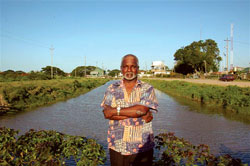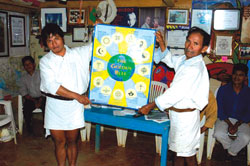A Golden Traveling Companion
With its message of peace and unity, the Golden Rule poster makes a welcome gift as I travel to other lands and cultures
By Vince Ramcharran
February 2006
Return to Table of Contents
Print Article
I was born on a sugar cane plantation in Guyana, South America, and grew up among Hindu and Muslim people. They had emigrated from India to replace the freed slaves as agricultural plantation workers. My community consisted of Hindu mandirs (temples) and Muslim mosques, and my family was among the few Christians present. I attended the Canadian Missionary Presbyterian School five miles' walk from my home, and the Catholic church about 20 miles away.
Multiculturalism and interfaith dialogue had long been a part of my life before I immigrated to Canada in 1967. As a Catholic, I find it spiritually encouraging to embrace other cultures and faiths. I enjoy visiting the local Sikh temple where I live in Prince George, British Columbia. Each spring I assist them in promoting an understanding of their faith within our community. I understand little of their language, but their songs and prayers stir emotions within me that I think started in my youth in Guyana. On Saturdays I enjoy attending the Bah'ai Faith Fireside Chat. And East Indian prayer songs sometimes bring a tear – probably influenced by the Hindi language I heard as a child.

Vince Ramcharran stands near the river where he swam as a child growing up on Albion sugar cane plantation 30 miles from New Amsterdam, Guyana. To the right is the noisy cane factory.
Credit: Leslie Latcha
My awareness of the world was heightened through my involvement with the Canadian Catholic Organization for Development and Peace (D&P) – the Canadian Church's overseas development agency. As a member of our local D&P group for many decades, I have met numerous overseas development partners who visited Canada and I in turn visited their diverse communities in other countries. Through our collaboration with KAIROS – Canadian Ecumenical Justice Initiatives, our D&P group also interacts with other Christian Churches here in Northern British Columbia.
While interacting with people of other faiths, I would often notice the Scarboro Missions Golden Rule poster displayed in many places of worship. The poster, which features the Golden Rule in 13 different faith traditions, also hangs in the chaplaincy program office at the University of Northern British Columbia. It occurred to me that the poster would be a good way to connect with different cultures as I traveled to other countries. I could share this poster as a gift and it would help form a link between our faiths.
I first took copies to Guyana where they are on display at my baptismal church in Port Mourant, Berbice, at the cathedral in Georgetown, and in the village of Charity on the Essequibo coast where many Indigenous people live. Posters are also on display at other smaller churches in the countryside.
At Tortola in the British Virgin Islands where I frequently visit relatives, the poster is on display at the Hindu mandir and at the Catholic church in Road Town, the capital.
India
Many posters hang in parts of India where I visited in January 2004 as a Development and Peace delegate to the People's World Water Forum in Delhi and the World Social Forum in Mumbai. One poster hangs in the room where Mother Teresa's tomb is located and in the offices of the Archbishop of Calcutta and the Bishop of Vasai. There is a poster in the St. Francis Seminary in Mumbai, and in the city's red light district in a meeting place that offers support to the women. There are also posters in many isolated tribal villages and in churches near the Nepal border where much of India's tea is grown.
While staying at St. Francis Seminary during the World Social Forum, I spoke with the yard cleaning woman, a Muslim. She invited me to her community for their Eid celebration at the end of Ramadan, the month-long fast. She, her husband and two teenage sons live in an eight-foot-square room with no windows and a sack hanging in place of a door. At night their kitchen equipment is placed under the bed to create open floor space where the boys sleep. During the day the bed becomes the table and provides seating.
After a meal that was shared with many of their relatives, I was taken on a tour through narrow alleyways in this impoverished community of about a thousand families. My host was very proud to show me her mosque and wanted me to take a photograph of it. I thought the picture would be enhanced with her in the photo. She declined, but I kept insisting. After a few minutes I took the picture of an empty room.
This incident bothered me. I felt that I might have missed a very important message about her faith. I thought back to my childhood in Guyana. I remembered my Muslim school friends not being at school on Fridays in order to attend their mosque. We passed the mosque regularly as our family had a rice field nearby. As my mind went back to this time, I finally recalled seeing the women sitting outside the mosque while the men were inside praying.
My Muslim friend in Mumbai could not be in my picture because as a female she was not allowed to stand in the mosque.
I believe understanding other cultures and faiths is very important to understanding our own. As Christians, if we want to become one in God, to be as sisters and brothers, we need to be open to others. If I stay isolated from others whom I perceive to have hurt me, or from people of other faiths whom I do not understand, I don't think I am on the path to oneness in God.
Chiapas, Mexico
Several Golden Rule posters are also displayed in the province of Chiapas, Mexico, where I visited many times as a guest of D&P's indigenous partners there. Chiapas is a place of much violence, hardship and daily challenges, mainly for the women and children. The poster, with its message of peace, unity and nonviolence, can be found hanging in the office of D&P partner DESMI (Economic and Social Development of Mexican Indigenous Peoples), as well as in a number of smaller churches in isolated villages, including a school at a village called Agua de Leon.
The poster also hangs in the centuries-old cathedral in the city of San Cristobal de Las Casas.

Two Mayan spiritual leaders in the village of Acteal hold Scarboro Missions' Golden Rule poster. Chiapas, Mexico.
Credit: Vince Ramcharran
On New Year's Day 1994, the Zapatistas – armed indigenous peasant farmers – captured the city in an attempt to make known to the world the suffering of the impoverished peoples of Chiapas. The uprising was timed with the launch of the North American Free Trade Agreement, which the Zapatistas saw as a death sentence for indigenous peoples. The Mexican government soon crushed the rebellion and the Zapatistas retreated back to their remote villages.
Today the Zapatistas are working towards the development of five self-governing communities where villagers are elected to serve. Political achievement, they feel, will enable their participation and voice in the global economic structures that heavily impact their lives and livelihood.
Ovantic, one of these Zapatista-governed communities in the highlands, is surrounded by 5,000 Mexican troops. Despite the military presence, four Women of Dignity Cooperatives coordinate crafts made in approximately 600 villages for sale on the international market. Our Development and Peace members in British Columbia assisted the women in the printing of craft catalogues for free distribution in North America and Europe.
Along with the school, medical clinic, restaurant and craft stores, in the middle of Ovantic sits a small Catholic church decorated in the ways of the local Mayan culture, and amidst all the decorations hangs a Golden Rule poster.
Another place of high emotion in Chiapas is Acteal. In 1997, the paramilitary invaded the village and massacred 45 women, children and men in the night. The entire village has become a memorial to those who were killed. Still standing is the old wooden church where many of the villagers ran for safety, only to be killed. Bullet holes can be seen in the church walls and the sheet metal roof. The Golden Rule poster, a symbol of peace and unity, hangs in the church.
The Golden Rule poster is also in the office of Bishop Felipe Arizmendi of the Diocese of San Cristobal. During our D&P visit there five years ago, he told us about the social injustice that exists in terms of unjust coffee prices. A farmer in Chiapas earns $2.00 a day for his long day's labour whereas a single cup of coffee sells for $2.00 in North America. Who makes the profit? In response to this issue, Development and Peace members in British Columbia and the Yukon are involved with a program to market for a fair price the coffee produced by farmers in Acteal.
Through D&P, we also hope to work with our indigenous partners to set up an exposure program that will take Canadian youth to the Solidarity Coffee Harvest in Chiapas. We hope that this will also garner support for these struggling peoples in their efforts to help themselves.
As I return to Chiapas, and then to India later in the year to help build mud-walled, thatched roofed houses for villagers displaced by flooding, the Golden Rule poster will again accompany me in my travels.
I believe the poster has a strong message of community and unity – that within diversity there is oneness in God. The poster carries a message of much hope for the world.
Return to Table of Contents
Print Article